Sustainable Development Goals
The Sustainable Development Goals Lions celebrate creative problem solving, solutions or other initiatives that harness creativity and seek to have a positive impact on the world.
Introduction

The history of the Sustainable Development Goals Lions
The Sustainable Development Goals (SDG) Lions were launched in 2018 in partnership with the United Nations to recognise and celebrate creative work that actively advances the UN's Sustainable Development Goals.
As part of this initiative, all entry fees for this Lions are donated to related-charities globally, with donations of over €1.6m funding vital projects worldwide.
What kind of work can be entered?
The Sustainable Development Goals Lions accept a broad range of creative initiatives designed to advance the UN’s SDGs. This includes public awareness campaigns, advocacy programs, innovative product or service designs, social impact initiatives and strategic partnerships across various sectors, including nonprofit, corporate and governmental.
Eligible work may take digital, physical or hybrid forms, but it must clearly demonstrate how creative execution contributed to significant social, environmental or economic impact. The work should align closely with the SDGs, such as climate action, gender equality, poverty alleviation, health and well-being and more, showcasing a direct connection between the creative effort and the positive outcomes achieved.
What’s the Jury looking for?
The work should demonstrate how it contributed to or advanced the 2030 Agenda for Sustainable Development across people, planet, prosperity, peace and partnerships.
Winning work showcases creative excellence, while delivering meaningful and enduring contributions to global development.
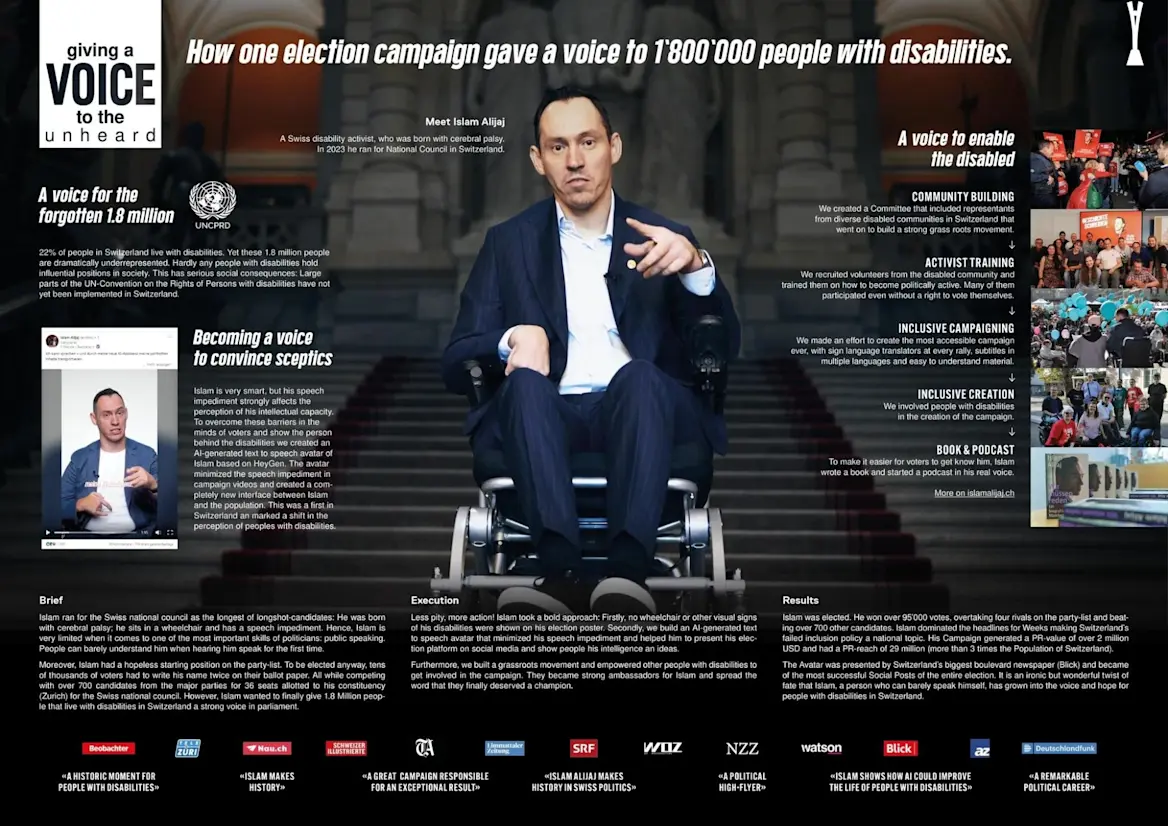
GIVING A VOICE TO THE UNHEARD | SWISS NATIONAL COUNCIL ISLAM ALIJAJ | TEAM FARNER, ZURICH | BRONZE, SUSTAINABLE DEVELOPMENT GOALS LIONS | 2024
The Categories

A. People
B. Planet
C. Prosperity
D. Peace
E. Partnership
F. Long-Term Brand Platform
Eligibility

For Sustainable Development Goals Lions the eligibility dates are 08 February 2022 - 10 April 2025 where the work being judged was first implemented within the eligibility period.
Exceptions:
- 'F01 Long-Term Brand Platform' must have been in the market for at least 3 years.
Is there a limit to how many times I can enter?
The same piece of work can be entered up to four times in Sustainable Development Goals.
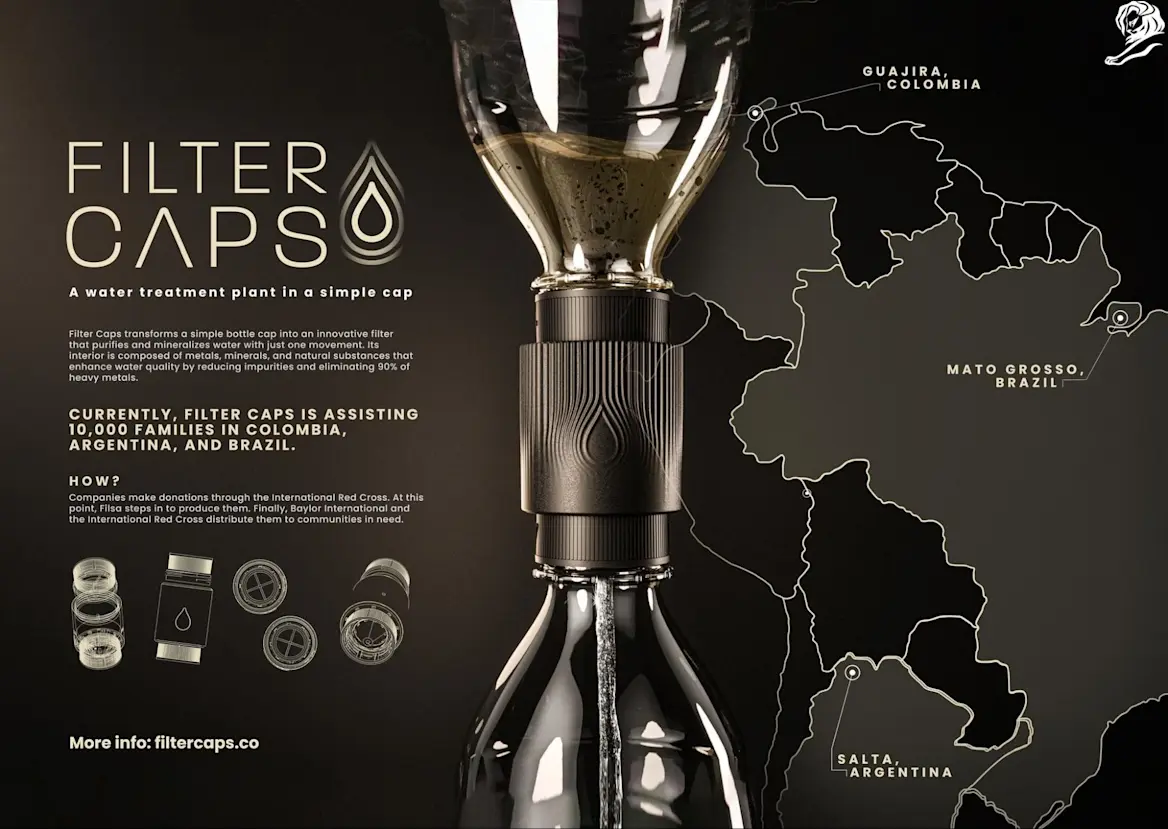
FILTER CAPS | FILSA COLOMBIA | OGILVY COLOMBIA, BOGOTA | GOLD, SUSTAINABLE DEVELOPMENT GOALS LIONS | 2024
Previous Winners

Renault - Cars to Work
Cannes Lions 2024 Grand Prix Publicis Conseil, Paris / Renault / 2024
Renault partnered with the French Public Employment Service to provide new employees with a free car for the duration of their 3-month job trial period and only start to pay for it once their job is secured. In the first year 6000 cars were made available.
RENAULT - CARS TO WORK | RENAULT | PUBLICIS CONSEIL, PARIS | GRAND PRIX, SUSTAINABLE DEVELOPMENT GOALS LIONS | 2024
Why the work won
The Sustainable Development Goals Jury awarded this work the Grand Prix for its commitment to a bold idea. Jury President Gustavo Lauria said: “It’s a great example of a brave brand that cares, takes risks and gets results. By helping people, Renault ends up selling cars and transforms consumers into loyal believers of the brand.”
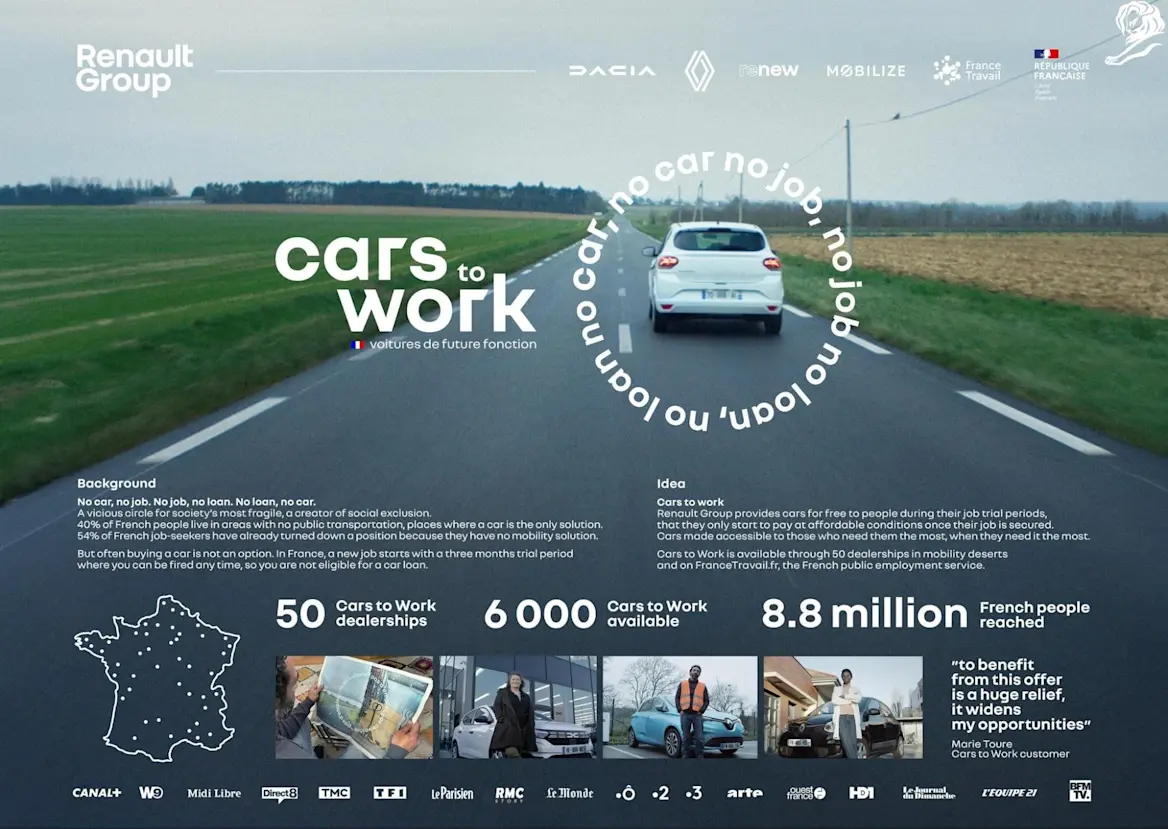
RENAULT - CARS TO WORK | RENAULT | PUBLICIS CONSEIL, PARIS | GRAND PRIX, SUSTAINABLE DEVELOPMENT GOALS LIONS | 2024
What the 2024 Sustainable Development Goals Jury were looking for
- Commitment from both the clients and the creative side
- Exciting, bold and creative commercial ideas
Entries & Judging

What are the judging criteria?
A number of criteria will be considered during judging, weighted as follows: 20% idea; 20% strategy; 20% execution; 40% impact and results.
What do I need to provide with my entry?
To enter, you’ll need to complete an online entry form, which can be found on the Cannes Lions entry site. In the ‘Written Explanation’ section, you’ll be asked to provide the Jury with everything they need to know about your work.
You’ll also be able to submit optional supporting materials to provide additional context with your entry.
Subtitles are highly recommended on all case films, films, demo films and original content.
Detailed information outlining the entry process can be found on A Guide to the Cannes Lions Awards.
What if I don’t have all the details right away?
Don’t worry – you can fill in the form in any order and save your progress at any time while it’s still in the pending stage. However, please only check out when your entry is 100% complete as no changes can be made to your entry once you’ve clicked “Submit” and “Checkout”.
The Written Submission

Here’s the questions you’ll be asked regarding your work.
To start your entry to the Sustainable Development Goals Lions, go to our Awards page.
The Jury will refer to the written explanation you provide throughout the judging process. Our advice is to provide as much relevant detail as possible.
When answering the following questions keep the main element you’re trying to celebrate in mind (e.g. the storytelling, the strategy, the craft, the use of data).
The bullet points under each question are prompts designed to guide your thinking, based on the factors the jury will be considering when reviewing your work. You might not need to use them all, and that’s totally fine. They’re there to help you consider what’s most important in your work.
Questions
Category Specific Questions
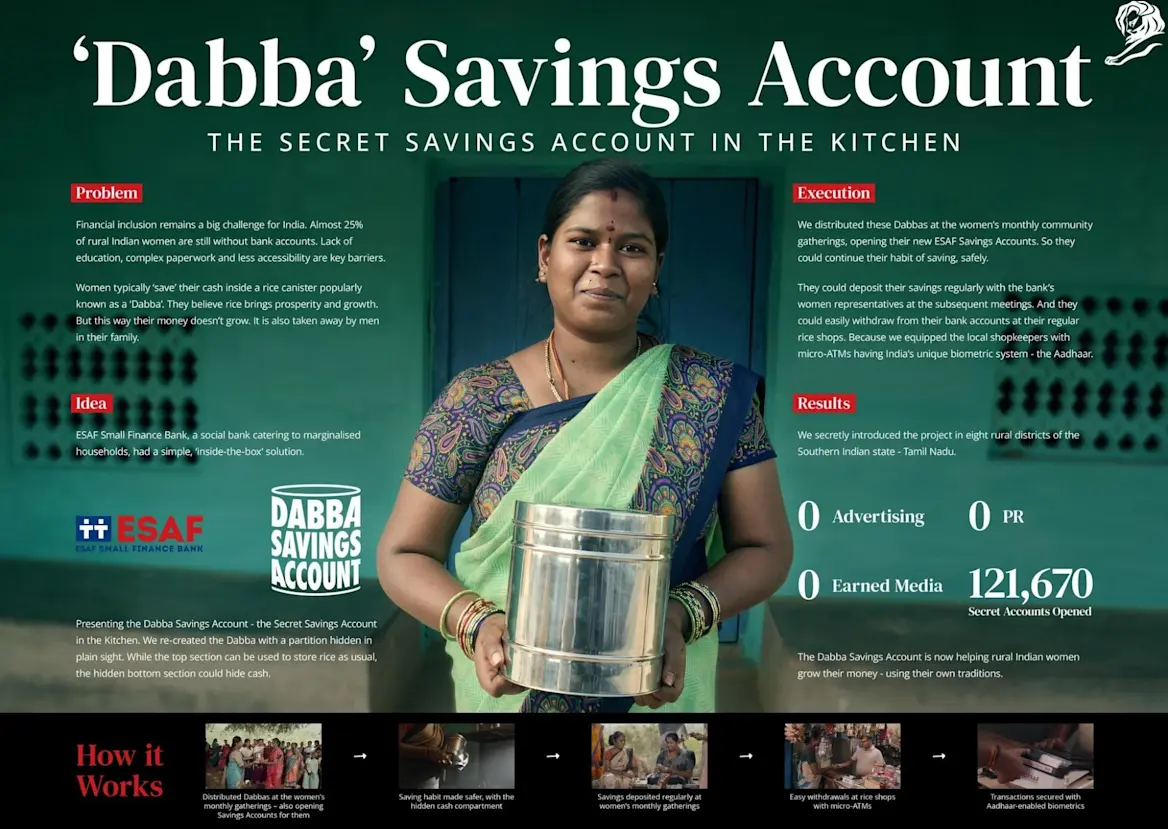
DABBA SAVINGS ACCOUNT | ESAF SMALL FINANCE BANK | MCCANN, GURUGRAM | BRONZE, SUSTAINABLE DEVELOPMENT GOALS LIONS | 2024
Contact us

Everything you need to know to enter
For more detailed information on how to use the entry site, craft a compelling submission or submit your work we have a whole range of resources.
From Entry Guides that give you a step-by-step overview of the entire process to the Entry Kits that provide all the detailed rules and requirements for each and every category.
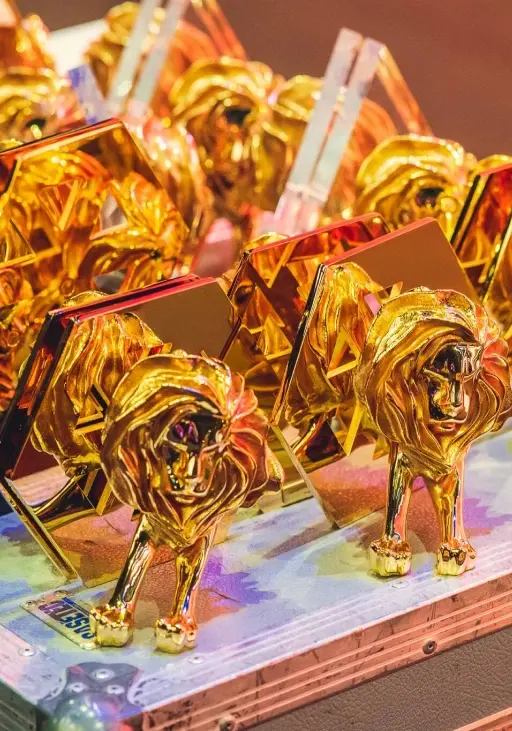
We are here to help
As Awards Experts, we know the Lions inside out. We can help with:
- Sharing the updates to the Awards for 2025
- Offering best-practice advice on how to craft a compelling entry
- Discussing your work and relevant categories
- Scheduling regular catch-ups to answer any questions that arise throughout the entry process.
Whether you have a specific query or would like expert advice, get in touch today.
Email: awards@canneslions.com Helpline: +44 0 20 7046 1155